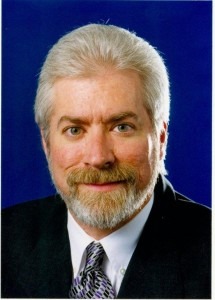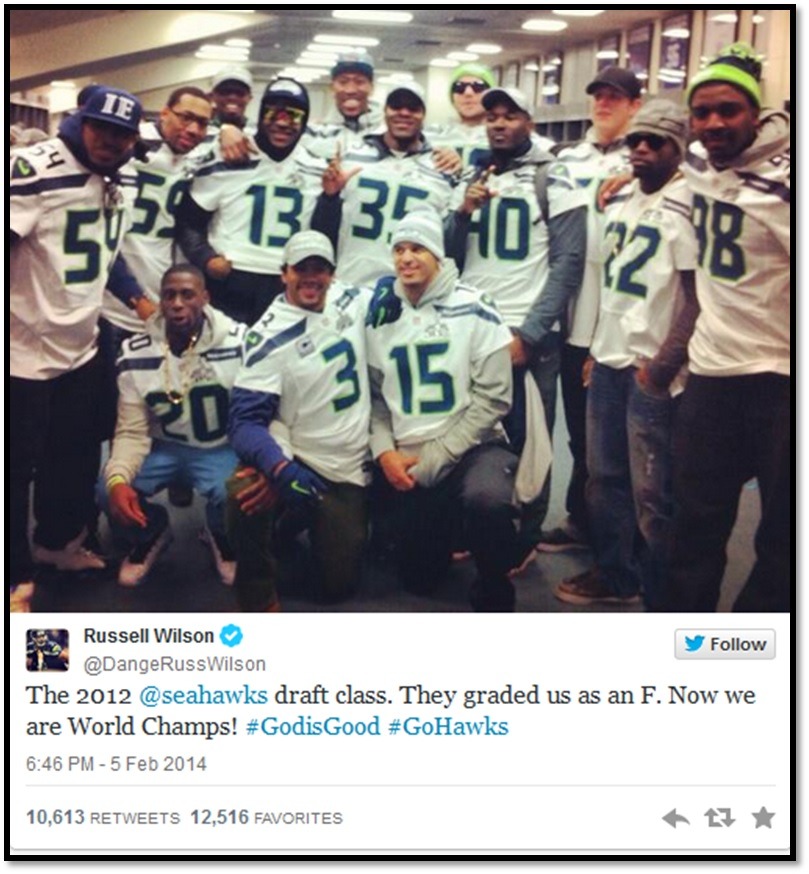 Those sports-radio analogies are just too tempting to pass up. So Bill Jacobs – inspired by the Seahawks’ lopsided Super Bowl victory earlier this month – takes a look at conventional wisdom, media pundits, and the truth of the matter in this guest post. – F
Those sports-radio analogies are just too tempting to pass up. So Bill Jacobs – inspired by the Seahawks’ lopsided Super Bowl victory earlier this month – takes a look at conventional wisdom, media pundits, and the truth of the matter in this guest post. – F
“After one of the worst picks in the first round I can ever remember, the Seattle Seahawks didn’t draft any positions of need or draft for the future. Pete Carroll is proving why he didn’t make it in the NFL the first time. As if the day wasn’t bad enough, Seattle selected Russell Wilson, a QB that doesn’t fit their offense at all and was by far the worst move of the draft. With the two worst moves of the draft, Seattle is the only team that received an ‘F’ on draft day.”
That monumentally wrong-headed prediction appeared in The Bleacher Report after the 2012 draft and it now ranks right up there in the annals of “worst sports predictions of all time.” And Russell Wilson and the rest of that Seahawks draft class didn’t forget:
Maybe to those of us outside of sports, it’s somewhat surprising that Wilson and the Seahawks even paid attention to this shot, let alone remembered it so well they acknowledged it after they won the Super Bowl. But the great ones don’t let negative prognosticators get them down – they use it as motivation to get better, work harder, up their game, and eventually win their own version of the Super Bowl.
For example, here are a few more epically misguided predictions:
“There’s no chance the iPhone is going to get any significant market share. No chance.” Steve Ballmer, CEO/Microsoft, 2007
“Guitar groups are on their way out, Mr. Epstein.” Dick Row, Decca A&R, 1962 to Beatles manager Brian Epstein
“Prediction – Romney 325, Obama 213. Yup, that’s right. A landslide for Romney approaching the magnitude of Obama’s against McCain. That’s my prediction.” Dick Morris, Republican strategist, two days prior to the 2012 election
“The band will go down like a lead balloon.” Reportedly said by the Who’s Keith Moon of the band that later took the name Led Zeppelin
“Some insist it’s just a passing phase.” Billboard Magazine on the state of the Classic Rock format, October 1986
Why do pundits so often get it wrong? Because they tend to base predictions on what’s worked in the past, on performance metrics, and ultimately, what is safe and comfortable. We gravitate to the tall quarterback because if you’re too short you can’t pass over the linemen. As we learned in Moneyball, teams draft talent that “look like ballplayers” instead of those who have a compelling combination of skills and intangibles.
This is true in the radio and music businesses as well. When we receive new music to review, we too often evaluate it on whether it sounds like established bands so we can slot them in, instead of looking for something new that resonates, that breaks through, that captivates instead of replicates. When Nirvana first broke, way too many programmers (and consultants) initially rejected them because they sounded so different from what Alternative stations were playing at the time – R.E.M. and U2 were part of the established sound in 1990. Some of the same comments were made during initial listens of Mumford & Son and Lorde.
The next big thing never sounds like the last big thing.
Remember the first time you heard Howard Stern? Who in their right mind would have hired this nasal New Yorker who talked about himself, his wife, his life, and of course, his sexual proclivities and fantasies? Howard won because he was unlike everything that came before, proving everyone wrong.
So throw out the metrics, the measurables, the predictions. While experience is invaluable, it’s time to use that experience not to replicate the past, but to stop basing each and every decision on what’s worked in the past.
This post is dedicated to talent, programmers, and yes, salespeople who were overlooked, written off, and otherwise underestimated – and yet overcame those odds and scored.
We need more Russell Wilsons to remind us of just how wrong we can be when we play it safe.
- What To Do If Your Radio Station Goes Through A Midlife Crisis - April 25, 2025
- A 2020 Lesson?It Could All Be Gone In A Flash - April 24, 2025
- How AI Can Give Radio Personalities More…PERSONALITY - April 23, 2025





Bravo, Bill. Bravo. Nicely written.
Thanks Keith — appreciate your thoughts!
For some reason radio has always had a “me too” attitude. Let’s say for example if you pitch some format or programming idea, the first response is almost always guaranteed to be: “where has that been done before?” or “They tried that in Albuquerque and it didn’t work.”
On the former: The attitude is almost universally “I ain’t gonna’ take no chances, if it hasn’t worked somewhere else, I’m not gonna’ be the pioneer. The hell with that. I’ve got a mortgage to pay.” Of all the estates, radio I think has been the biggest offender of the “me too” mentality. You’re never gonna’ hear, “oh, that’s already been done. what else you got?” No one else here to blame for this stale mentality than management. On the subject of management, here’s an interesting article I came across this morning.
Good engineering managers aren’t just hard to find — they don’t exist
https://tinyurl.com/o4bcs6n
In a nutshell, silicon valley has a really tough time finding engineering management: The best engineers get all the benefits of being leaders, but without needing to take on the rather painful duties of management. So they choose not to move up. The engineers who aren’t as strong in their field, use the opportunity to move up as a way to get their voice ahead. It’s the old those who don’t do, teach. Those who can’t teach, manage conundrum.
Sound familiar? We’re not the only ones with leader and management problems.
On the later (the Albuquerque example), just because it’s been tried somewhere, and failed, doesn’t mean it wasn’t a good idea, maybe it just wasn’t executed properly. Just because (say for example, talk radio for teen’s or firing your “professional” staff on a rock station and replacing them with passionate but inexperienced college kids) may have been tried in Plattsburgh, and failed, logically there may have been many other factors involved in it’s failure. Just because someone starts a hamburger joint and fails, it doesn’t logically follow that all hamburger joints are doomed to failure. Some enterprising, passionate and fearless entrepreneur is always gonna’ give it a whirl. (ie: smashburger or hell, chick fil a).
Good article Bill. We need to be reminded that this used to be a business always forging the “next big thing,” and unfortunately most of what we produce these days is the “same old thing.”
Out of time… off to sell my wares…..
John, I’ll let Bill respond on his own, but your comment about formats reminded me of some of those early Classic Rock pitches when I couldn’t get arrested with the format. I was almost convinced that Classic Rock was an AM format because I simply could not convince any FM stations – including some perennial losers – to try it. Then once the format started to happen, I would meet with the sales staffs at Classic Rock startups, and the question was, “Who does this format sound the most like?” And I would respond that it doesn’t sound like any format – and that was the whole point. It was unique to radio when it came out – there weren’t stations playing that mix of music in that way at that time. It’s a tough road hacking through the tall grass in any business, but radio seems to be especially skeptical about new things – to its detriment. Thanks, John.
Like so many other things it just takes “one,” John to get the ball rolling. Whether it’s the first Stern station, the first FM Classic Rock station, or the first Jack station it just takes that one person who sees the value, is willing to take the chance (or perhaps is desperate enough to do it). Yes, the radio landscape is littered with failures but getting out of the “same old thing” and aiming toward “the next big thing” is what’s sorely needed in the industry. Appreciate your thoughts!
Comparing, contrasting or just plain worrying about “same old thing” vs. “the next big thing” is exactly the problem we are seeing in all sectors today. Stacking up all the cheese instead of using it to create is the biggest mistake companies can make. Those willing to embrace change will be those whose reap the benefit & increased market share while the laggards pick up the scraps.
Yes, it is trite & cliché – but it also happens to be reality. Always has been, always will be for those who are awake, eyes open & ready.
Cheers…
Peter, you are correct – it’s a mindset. If you embrace change and build on what you have, those speed bumps and challenges become opportunities. Thanks for taking the time to chime in.